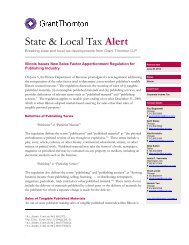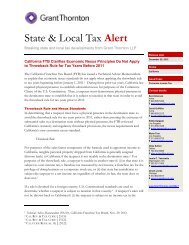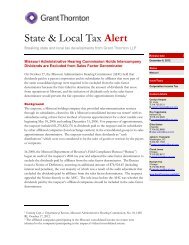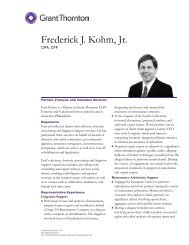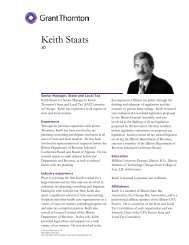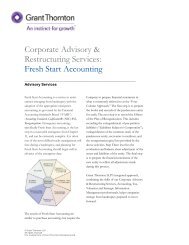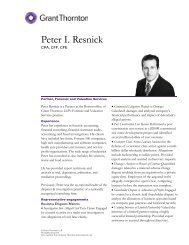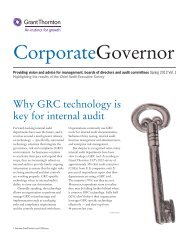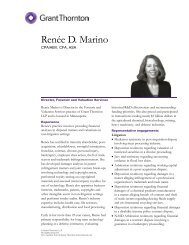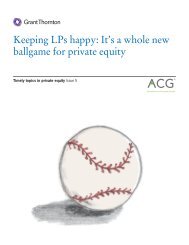Bank Director Presents - Grant Thornton LLP
Bank Director Presents - Grant Thornton LLP
Bank Director Presents - Grant Thornton LLP
You also want an ePaper? Increase the reach of your titles
YUMPU automatically turns print PDFs into web optimized ePapers that Google loves.
<strong>Bank</strong> <strong>Director</strong> <strong>Presents</strong>: Acquire or be<br />
Acquired<br />
Structuring a Deal That Adds Up<br />
David M. Burns<br />
Financial Institutions Partner and<br />
Northeast Practice Leader<br />
Todd Sprang<br />
Financial Institutions Partner and Chicago<br />
Practice © <strong>Grant</strong> <strong>Thornton</strong> Leader
The Acquisition Process – Our Focus…<br />
Post-Acquisition<br />
Evaluation<br />
Develop Strategic Plan<br />
Develop<br />
Acquisition<br />
Related Strategic<br />
Plan<br />
© <strong>Grant</strong> <strong>Thornton</strong><br />
Closing the<br />
Transaction<br />
Financial and<br />
Accounting<br />
Considerations<br />
Search and<br />
Screen Potential<br />
Targets
Hedge Accounting<br />
• Short – cut documentation<br />
• Hedging brokerage CD's<br />
© <strong>Grant</strong> <strong>Thornton</strong>
Analyzing the Securities Portfolio<br />
Impairment within the portfolio and guidance under<br />
SOP 01-6, FSP – FASB 115-1 and 124-2<br />
• Fannie and Freddie Preferred Stock<br />
• FHLB Stock and related dividends<br />
• Policies related to impairment due solely to<br />
changes in interest rates<br />
© <strong>Grant</strong> <strong>Thornton</strong>
Deferred Loan Fees and Costs<br />
Prominent practice issues:<br />
• Costs are not being determined correctly<br />
• No cost analysis is being conducted<br />
• Straight line versus level yield method<br />
© <strong>Grant</strong> <strong>Thornton</strong>
Miscellaneous Items<br />
• Changes to pension accounting which impact<br />
capital<br />
• Lease loans<br />
• FDICIA – Amendment to Part 363<br />
© <strong>Grant</strong> <strong>Thornton</strong>
Uncertain Tax Positions<br />
• Accounting for Uncertain Tax Positions – an<br />
interpretation of FASB Statement No. 109<br />
(Proposed Interpretation)<br />
• ED issued July 2005<br />
• Comment period ended Sept 2005<br />
• Final anticipated in 1 st quarter 2006<br />
© <strong>Grant</strong> <strong>Thornton</strong>
Determine how your financial statements may be<br />
impacted<br />
The proposed Interpretation:<br />
"…could lead to larger tax liabilities…"<br />
The Wall Street Journal, "FASB Unveils<br />
Draft Corporate-Deductions Rules,"<br />
July 15, 2005, page C3<br />
"…will have a decidedly negative impact on earnings…"<br />
BNA Daily Tax Report, "Analysts Should Be Prepared to Revised<br />
Downward 2005 Earnings Estimates Because of FASB<br />
Pronouncement on Accounting for 'Uncertain Tax Positions',"<br />
July 20, 2005, page J-1<br />
© <strong>Grant</strong> <strong>Thornton</strong>
Uncertain Tax Positions<br />
An enterprise would be required to recognize, in its<br />
financial statements, the best estimate of the impact<br />
of a tax position, if that tax position is probable of<br />
being sustained on audit based solely on the<br />
technical merits of the position. In evaluating whether<br />
the probable recognition threshold has been met,<br />
this proposed Interpretation would require the<br />
presumption that the tax position will be evaluated<br />
during an audit by the taxing authority.<br />
© <strong>Grant</strong> <strong>Thornton</strong>
Uncertain Tax positions<br />
Individual tax positions that fail to meet the probable<br />
recognition threshold will result in either:<br />
(a) a reduction in the deferred tax asset or an<br />
increase in a deferred tax liability or<br />
(b) an increase in a liability for income taxes<br />
payable or the reduction of an income tax<br />
refund receivable<br />
© <strong>Grant</strong> <strong>Thornton</strong>
Uncertain Tax Positions<br />
Benefits from tax positions that previously failed to<br />
meet the probable recognition threshold would be<br />
recognized in any subsequent period in which that<br />
threshold is met.<br />
© <strong>Grant</strong> <strong>Thornton</strong>
Accounting for Investments in Real Estate Ventures<br />
• FSP – SOP 78-9-1 issued July 2005<br />
• Purpose – Assessment of whether a general<br />
partner, or the general partners as a group,<br />
controls a limited partnership<br />
© <strong>Grant</strong> <strong>Thornton</strong>
Accounting for Investments in Real Estate Ventures<br />
Eliminates the concept of important rights in<br />
paragraph .09 of SOP 78-9 and replaces it with the<br />
concepts of kick-out rights and substantive<br />
participating rights as defined in Issue 04-5.<br />
© <strong>Grant</strong> <strong>Thornton</strong>
Accounting for Investments in Real Estate Ventures<br />
The rights and obligations of the general partners in<br />
a limited partnership are different from those of the<br />
limited partners and, accordingly, the general<br />
partners should be presumed to control the limited<br />
partnership. However, the rights of the limited<br />
partners may overcome that presumption of control.<br />
© <strong>Grant</strong> <strong>Thornton</strong>
Accounting for Investments in Real Estate Ventures<br />
• For GP's of all new partnerships formed and for<br />
existing partnerships for which the partnership<br />
agreements are modified, the guidance in this FSP<br />
is effective after June 29, 2005.<br />
• For GP's in all other partnerships, the guidance in<br />
this FSP is effective no later than the beginning of<br />
first reporting period in fiscal years beginning after<br />
December 15, 2005<br />
© <strong>Grant</strong> <strong>Thornton</strong>
Sales Leasebacks Pitfalls<br />
• FASB Technical Bulletin (FTB) No. 79-11, Effect of<br />
a Penalty on the Term of a Lease<br />
• Paragraphs 5(f) and 5(o) of FASB 13, amended,<br />
provide that minimum lease payments should<br />
include amounts that would be payable for “all<br />
periods, if any, for which failure to renew the lease<br />
imposes a penalty on the lessee in such amount<br />
that a renewal appears, at the inception of the<br />
lease, to be reasonably assured<br />
© <strong>Grant</strong> <strong>Thornton</strong>
SEC Advisory Committee on Smaller Public<br />
Companies recommends exemptions from Section<br />
404<br />
• Recommendation # 1 – Exempt “Microcap”<br />
Companies from All Section 404 Requirements<br />
• Recommendation # 2 – Exempt “Smaller Public<br />
Companies” from the Internal Control Audit<br />
Requirements of Section 404<br />
• Recommendation # 3 – Only Require the “Smaller<br />
Public Companies” to Obtain an Opinion on the<br />
Effective Design of Internal Controls from Their<br />
Auditors<br />
© <strong>Grant</strong> <strong>Thornton</strong>
Reminders from Last Year<br />
• Changes in Trust Preferred Securities accounting<br />
final ruling March 2005<br />
• FASB No. 123(R) issued in December 2005 and<br />
SEC issued implementation guidance in SAB 107<br />
in March 2005<br />
• FASB Project: Applying the Acquisition Method<br />
and Combinations between Mutuals<br />
© <strong>Grant</strong> <strong>Thornton</strong>
Proposed Changes in Trust Preferred Securities…<br />
• Until March 31, 2007, TPS will continue to count as<br />
Tier 1 capital up to 25% of core capital<br />
• After March 31, 2007, TPS will continue to count<br />
as Tier 1 capital up to 25% of core capital, net of<br />
goodwill<br />
© <strong>Grant</strong> <strong>Thornton</strong>
Proposed Changes in Trust Preferred Securities…<br />
• Net of goodwill, what does this mean?<br />
– Primarily impacts BHC's with substantial goodwill<br />
accumulated from acquisitions<br />
– Reduces allowable TPS and Tier 1 capital by an amount<br />
equal to 1/3 of goodwill<br />
© <strong>Grant</strong> <strong>Thornton</strong>
FASB 123 (R)<br />
What is the proper classification?<br />
– Equity classification<br />
– Liability classification – when employees can<br />
compel entity to settle them by transferring cash<br />
or other asset rather than issuing shares<br />
© <strong>Grant</strong> <strong>Thornton</strong>
FASB 123 (R)<br />
• Two choices for application<br />
– Modified-prospective – prior unvested portion<br />
plus vesting for current options.<br />
– Modified retrospective – recognize employee<br />
compensation cost for prior periods presented<br />
© <strong>Grant</strong> <strong>Thornton</strong>
Questions?<br />
© <strong>Grant</strong> <strong>Thornton</strong>
Contacts<br />
• David Burns, Financial Institutions Partner and<br />
Northeast Practice Leader<br />
– 215-656-3048 David.Burns@gt.com<br />
• Todd Sprang, Financial Institutions Partner and<br />
Chicago Practice Leader<br />
– 312-602-8040 Todd.Sprang@gt.com<br />
© <strong>Grant</strong> <strong>Thornton</strong>




